P.C. Zick's Blog, page 54
October 4, 2012
Tenacity = Writer

Tenacity
We found this tree while driving through the Rocky Mountains. Its tap roots must be very long in order to find water through the rocks. This aspen tree demonstrates the qualities of tenacity. The word tenacious comes from the Latin tenac, which means “tending to hold fast.” Synonyms for tenacity include stubbornness, obstinacy, resolve, drive, determination, and courage.
We writers show the same qualities; we must. How else to explain why we continue to write when books don’t sell well, when negative reviews are received, and when it seems no one in the forest is listening. It’s also an isolated occupation, just as this lone aspen in the rock demonstrates.
Yet when we tap into those reserves deep within us, pure magic occurs. This happened to me this past week when I completed the final draft of my new novel. For the first time, I felt a deep satisfaction in what I had accomplished for no other reason than I finished the book, and I like the result. I’ve probably thought too much about what others might think of my books in the past, but this one – the first I’ve been able to write full time – gave me an inner satisfaction. It would be nice if others like it, too, but it doesn’t really matter. I showed to myself what I could do. I stuck with it despite any monetary gain or pats of the back from an adoring public. I let my tap roots go deep, and the pay off came when I finished reading the last line and discovered tears on my face – tears of joy. The story moved me, even though I created it. The discovery of finding that source within me will keep me going until I meet the next challenge. Right now I’m glowing as much as this little aspen tree in Colorado.
On the wall behind me, I have two plaques describing my astrological sign of Capricorn. One lists these attributes of the goat: stubborn, never satisfied, insatiable, unmovable. The other one lists these: determined, hard-working, resourceful, thoughtful, organized, patient.
I chose the right/write career, but there are days when I suspect this career chose me. Thank goodness for my tenacious nature.
How about you? Do you feel this career is well suited for your personality?


October 2, 2012
Versatile Blogger Award
This week my blog Writing Tips, Thoughts, and Whims was nominated twice for the Versatile Blogger award by two bloggers I greatly admire. Thank you, So Much To Write, So Little Time and 365 Things to Wrote About. If you don’t follow them already, visit their site. I think you’ll be as impressed as I am with their informative and inspiring blogs.
My other blog, Living Lightly Upon this Earth, has received several awards since I started it in March. However, this is the first award for my writing blog, and I’m delighted.
As a requirement for accepting this award, I’m supposed to provide seven random things about myself and tag 15 other blogs I admire. I hope you’ll visit the other sites. While I follow quite a few blogs, I’m going to stick to ones strictly about writing. We writers must stick together. I truly believe when one of us succeeds, we only move a step forward.
Random things about me:
I begin most of my drafts on a legal pad with a very sharp pencil. I might only write a paragraph this way, but it’s the way I start all major works.
I like peanut butter and jelly sandwiches with a wedge of sharp cheddar cheese and a cold glass of milk for lunch.
I suffer from directional dyslexia (my term). I have a tough time distinguishing left from right, front from back, etc. I have a letter I wrote to Santa when I was eight asking for my “two back teeth.”
Numbers and I do not get along. We’ve been at war since junior high school.
Words are my friends.
I believe algebra should be outlawed because it just isn’t right to create formulas using letters, numbers, and punctuation as if it was a real sentence!
I have a weird sense of humor. My best friends are the ones who laugh at anything I say even if they don’t understand what I mean.
Tagging those favorite blogs now. Stop by and leave them a comment – we all need comments!
The Neophyte Writer
Kana’s Chronicles
Hazy Shades of Me
Kate Brauning
Katie Jennings
Jodi Ambrose’s blog
Novel Girl
The Stobe
headywriting
Staci Troilo
Kristen Lamb’s Blog
lifeintheblueridges
Rosalie Squires
Charrion’s Chatter
3rd Rock in the Sun
There are so many other inspiring blogs out there; I know I’ve left some of my favorites out. Congratulations to you all for doing what you can to expand and explore our craft.


September 27, 2012
Juxtaposition – A wonderful word
I love language. Certain words intrigue me. One of my favorites has always been “juxtaposition.” I love saying the word, but try working it into conversation on a regular basis.
My dictionary from college sits on my desk with its torn binding and yellowing pages, but I still use Webster’s New Collegiate Dictionary from 1973. I know I can go to my online dictionaries, but I love my old “real” reference book.
Here’s what it tells me about my favorite word.
Juxtaposition comes from the Latin word juxta which translates as near. Definition: the act of or an instance of placing two or more things side by side; also, the state of being so placed.

The juxtaposition of the danger sign and the bucolic setting shows that nature demands respect.
Hey, bucolic is a pretty good word, too.
What’s your favorite word?


September 26, 2012
Writers, Respect The Reviews!
 Reblogged from So Much To Write, So Little Time:
Reblogged from So Much To Write, So Little Time:
Reviews are the lifeblood of the indie publishing world. That’s why they should never be tampered with, and yet authors are still buying five-star reviews, posting fake reviews, having friends and family write glowing reviews when they haven’t read the author’s story, or the worst in my book, unpublishing their work and republishing it when they don’t like the one star real reviews readers gave them.
September 25, 2012
Revising – Dread then Joy

writer’s hotel on the coast of Oregon
I finished the second draft of my new novel Trails in the Sand before leaving on a trip to Denver two weeks ago. I like to have deadlines like that because once you leave a novel for a few days, it’s almost like starting over again. Since the incubation period is a necessary part of writing for me, I like to have something finished when I leave it. I timed it perfectly.
However, when I returned from my trip, I spent three days moping. I couldn’t bring myself to open the three-ringer binder where the draft rested.
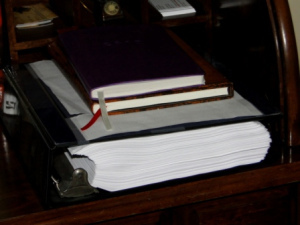
second draft – all 538 pages
I walked by it, looked at it, and continued on my way – usually to lie down or to clean a toilet, hoping for the divine intervention of my muse. By day three, I was tired of my pitiful self and decided to do what I hate most. I went shopping. That’s desperation. But it worked.
I came home that afternoon and removed the notebook from its spot on an unused desk in the living room. I opened it up, and I began to read. And suddenly, I wanted to do nothing more than sit with my creation and revise it. I wrote a new four page opening to chapter one. Since I’m writing an environmental story, I needed to open in nature not with the protagonist lying in bed savoring the first cup of coffee of the day.
It’s true that the worst thing is probably the anticipation of starting a task. Once I got over myself and began the work, I discovered once again that for me, telling a story is the second biggest passion of my life. Thankfully, my first passion – my husband Robert – accepts his close second and knows it enhances me when its going well.
Because when the writer in me isn’t writing, ain’t nobody gonna have a good day.
How do you get inspired to get down to the task needed to be done?


September 20, 2012
Following the Muse
By Patricia Zick @PCZick
Sometimes the muse leads us where we need to go. In early 2002, I was working on a novel set on the Suwanee River. I was also a reporter for a 5,000 circulation weekly newspaper in north Florida. I covered one of the more contentious city commissions as WalMart began doing what WalMart does best – push their way into small towns with little regard for community.
One Tuesday morning in February, I made my rounds of the local city police departments to pick up the police reports for the past week before heading to the newspaper’s office. When I turned the corner, police tape encircled the building, and I saw my coworkers wandering around outside.
“Don’t worry – no one was hurt,” the publisher said as he rushed toward me when I got out of my car. “They were able to detonate the bomb before anything happened.”
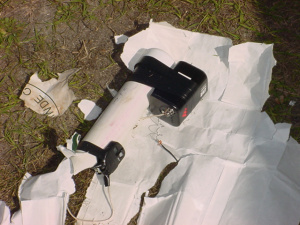
the bomb after detonation
He thought I already knew someone dropped a bomb off in the paper’s drop box. When it was discovered, the local police called the county bomb squad. The bomb, filled with little bits of glass and nails, shot 70 yards outside the building when set off by the experts.
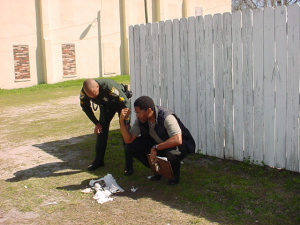
bomb experts investigate
We were barely six months past 9/11, and the world reeled around us. The national media started calling, but the FBI said it would be months before a full-scale investigation could begin. Around the same time, mailboxes were being blown up in the Midwest and our little bomb scare with no deaths amounted to nothing after the first twenty-four hours. It amounted to nothing for everyone, except those of us closest to the action such as me. I went away to the Keys a few days later for a planned and now much needed vacation.
As the breezes blew through the curtains of the beach house, I woke with a line in my head.
“The bomb sat on Kelly Sands desk for an hour before she noticed it.” I went in a trance to my laptop on the kitchen table and typed in the line.
Four years later, when Tortoise Stew was published that line opened the novel. I forgot about the other novel and wrote through my fear of another bomb finding its way to the drop box or under the hood of my car as I sat at yet another commission meeting with shouting matches and arrests as a matter of course for the small town. My muse wrote Tortoise Stew.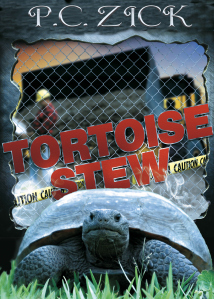
Today, Friday, September 21, if you’d like to read that first line, it’s free on Kindle at amazon.com.


September 19, 2012
Sticks and Stones and Words
The biggest lie from childhood: Sticks and stones may break my bones, but words will never harm me.
Hit me with a stick or throw a stone at me anytime rather than tell me that my face is ugly or my clothes are old or my mother wears army boots. Tell me those things, and I crumble.
Yet the insults and ridicule begins at a very young age whenever someone does something outside the norm of behavior. Where do we learn to insult one another for our differences? Does it come from somewhere deep inside our psyche? Is it so ingrained in our personalities that it begins with the acquisition of language?
Many times we throw the slings and arrows of words to protect ourselves. They serve as a red herring for the soul, deflecting them from coming directly back at us. We are taught the old adage about stick and stones in order to make ourselves tough and to let go of those insults. But how often do they really just roll off our backs? Those words pierce their way into our hearts and souls, leaving wounds. Some of us can heal those wounds over time; others never can.
The wounds that never heal become festering blisters of pain. Words serve, not as the sticks and stones of our childhood, but as the timber and boulders which threaten to come crashing down to smother us.
When I was a teacher, one of my students, a young man of seventeen, woke up one morning and no longer wanted to face the timber and boulders of his daily life at school because he was different. It doesn’t matter how he was different, but he was. He was ostracized and ridiculed for it. He would hide it, deflect it, and strike back because of it. But finally the struggle to do all of those things while still living the life of a teenager became too much, and he couldn’t face another day.
So he woke up that morning and decided he’d had enough of his life. He swallowed 400 Tylenol pills in an effort to end the pain and struggle. For more than two weeks he lingered in and out of this world. Thankfully, he survived, but the repercussions sent out ripples, and the emotions came in waves of guilt.
Some of his peers wondered if they could have done something for him while the adults wondered why they didn’t do more. A week before the suicide attempt, I took my concerns to his guidance counselor. I was told not to worry; he wasn’t going to do anything rash. I informed his parents that I sensed something wasn’t right. Even though I’d done a few things, I still tormented myself with what more I could have done.
What I should have done was intervene when I saw other students shooting off the bullets of words that taunted this young man. I thought at the time, I was doing the right thing by not highlighting the insults. I was wrong.
We are a society founded on the tenets of individual freedom yet we have become something else in our struggle to protect the rights of a diverse people. We do not applaud the standard bearers or the trail blazers until they have made lots of cash from their achievement. Then we are ready to join the bandwagon as we erect statues to their heroism. We put on pedestals those who are different only when they have achieved a status we can only appreciate in our little superficial souls. That doesn’t happen much in the world of a teenager.
We all must remember words and language contain the power to harm and the power to heal. I chose every day to use my words wisely to make the world a better place where we don’t need nursery rhymes to hide behind reality. I may not always succeed, but I sure give it a good effort.


September 13, 2012
Incubating a Novel
“Write. Rewrite. When not writing or rewriting, read. I know of no shortcuts.”
Larry L. King
My new novel is incubating. I finished the complete first draft in February. I gave it over to two beta readers who sent back their comments and suggestions in May. In the meantime, I read. One book that captured my attention was Jennifer Egan’s A Visit from the Good Squad. She experimented with point of view so much that at first I didn’t think I’d enjoy this Pulitzer Prize novel. However, I found myself drawn to her experimentation with her characters and their voices and the non-linear plot line.
The comments from my first readers of Trails in the Sand made suggestions about the flashbacks and suggested lack of development of certain characters. My reading led me to revamping my second draft. Each chapter changes point of view and character. I finished this draft August 28 and sent it back to one of the betas. I await her pronouncement on the first fifty pages.
“I need to know immediately if the direction works,” I told her the other day when she called to apologize for not starting to read it yet. “It may be painful for me to hear, but I need to know if I’ve gone off my rocker with the experiment.” She agreed she would let me know as soon as she could.
In the meantime, I the novel rests on an unused desk in the living room. I walk past the manuscript in its three-ring binder, but I resist the urge to open it up. The characters, plot, and me need a break.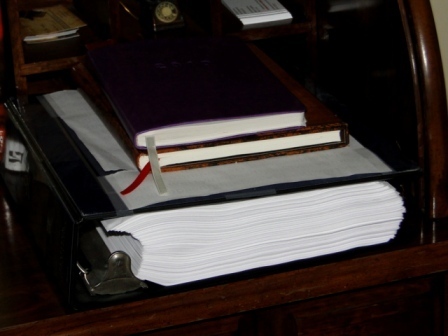
To keep me occupied, I read. The pile on the coffee table threatens to fall, but I am making progress.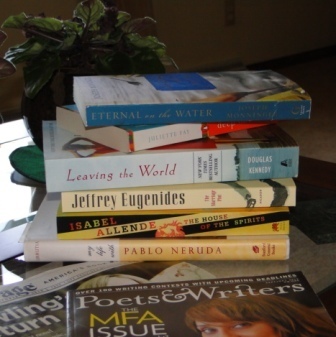 Even though I do have my Kindle and read occasionally from it, I still love the feel of the real thing in my hands. I love the smell of a new book opened for the first time. I like looking at the book cover next to my nightstand when I wake in the morning.
Even though I do have my Kindle and read occasionally from it, I still love the feel of the real thing in my hands. I love the smell of a new book opened for the first time. I like looking at the book cover next to my nightstand when I wake in the morning.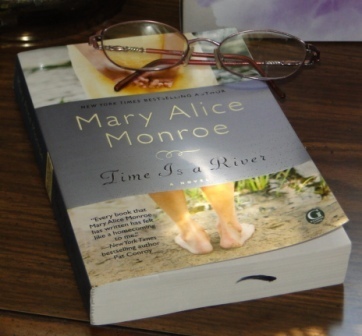
The rewriting will come soon enough. I already have an idea for revamping the beginning scene to bring it more in line with the theme of the novel. The idea came from a book I’m currently reading.
We writers may be the storytellers, but we are also the readers. There are no shortcuts.


September 11, 2012
“Once a Upon a Time” is thankfully in the past
Note: I wrote this column about publishing my first novel in 2000. Times have changed and after re-reading this piece and remembering, I’m happy they have. Viva la revolution!
All I ever wanted to do was write, but I kept that knowledge to myself as I went to college and then became a teacher. Each summer I would pretend to be a writer. I might write a chapter on a novel, or I’d write an essay, but I never continued once I went back to the classroom with teenagers who I attempted to turn into Hemingways.
For a decade that unfinished novel lurked in a file cabinet staring at me reproachfully whenever I reached into the drawer. Like the romantic images of the writer, my novel sat enticing me until a wise man said to me, “It’s time to quit making excuses for not writing, and just do it if that’s what you want to do.”
I pulled out the abandoned novel, stopped making excuses, and I began to write.
Once I started, I couldn’t stop. The words came sometimes painfully, or sometimes faster than my fingers could type. Within two months I had a complete novel, and within the year, a small publisher accepted my book, A Victorian Justice (published under my former name, Patricia C. Behnke).
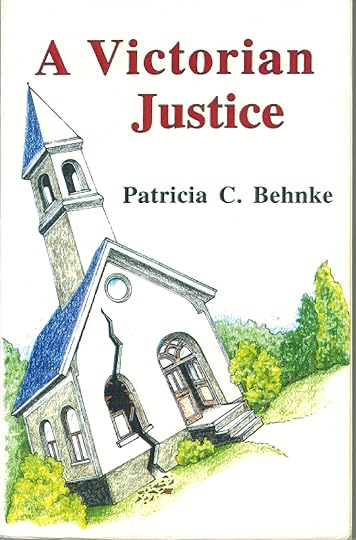
first novel
I never considered the next steps. My publisher told me I needed to get out there and sell my books. No one was knocking on my door to buy them.
I went to Ann Arbor, the largest city near the setting of my novel. I began pounding the city pavement in my high-heeled sandals carrying a large brief case loaded with books and press releases.
“You should have stayed home,” the first bookstore owner said. “If you aren’t famous nationally, you need to be at least well-known in this town. We’re used to famous people here in Ann Arbor. Getting started with your first book is nearly impossible.”
I shifted my briefcase to the other shoulder and entered bookstore number two.
“Who did you say you were again?” the manager asked. “What did you say you wrote?”
“We only book famous authors here. We get quite a few in Ann Arbor. But maybe we’ll order your book for a little local color.” She at least delivered her words with a smile.
My head began to hang just a little lower, my feet ached, and my briefcase became a burden, but I continued on my quest.
“I wouldn’t possibly be able to generate enough publicity before July to have you here for a signing. Now if you were famous. . .”
Why did everyone insist on telling me I wasn’t famous? Would a famous person be walking around a hot city lugging a twenty-pound briefcase and wearing sandals made for a wedding reception? I was painfully aware of my status as a non-famous person.
“Look, there’s someone who’s not famous,” I imagined customers whispering as I dragged my briefcase out the door. The will to put it on my shoulder abandoned me.
Somehow, I managed to gather the strength to continue my quest and arranged for ten book signings in Michigan. I ended up selling 500 copies of my first novel A Victorian Justice. I sold those copies one by one, handshake by handshake, and a little bit of my writing soul went with each autograph and each copy.
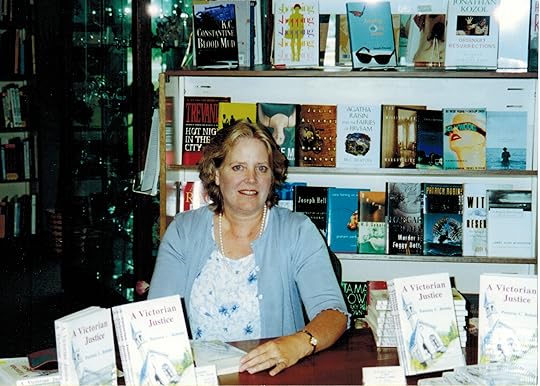
First book signing, Chelsea, Michigan, June 2000
Twelve years later, I’m happy to sit at my desk or outside on the deck while my books sell themselves (with a little push from me) through the miraculous reach of the Internet. I’ll leave the book signings to the more famous among us.

selling books today


September 6, 2012
The Language of Doublespeak
The toolbox of the writer contains one major item: language. I respect the power of language and despise the devices of trickery involving its usage.
Doublespeak in particular represents the language of subterfuge. It hides, covers, and ignores the truth. Doublespeak rests in the toolbox of politicians, CEOs, and used car salesmen.
However, the military remains the winner of my doublespeak award, and none more false, deceiving, and confusing than the term “friendly fire.”
When used to describe the cause of death of a soldier, does it make the death any more acceptable than if it had been from enemy fire? The term “friendly fire” doesn’t even deserve recognition as an oxymoron. An oxymoron joins two opposites, which make a certain kind of sense, such as the term “jumbo shrimp.”
However, there is nothing friendly about the fire from a gun. If somehow the military hopes to soften the figures of war casualties by categorizing a death in this way, we must remain vigilant in not falling prey to gullibility. Friendly fire or not, in a war zone, it is still a casualty of war if those bullets hit a soldier.
Doublespeak deceives. When the military releases information to the press or when politicians make speeches, then the press — the Fourth Estate — must be vigilant as well. When we use benign language applied to horrific concepts, we bury our minds to atrocities.
For example, during Sudan’s horrific civil war, the deaths were referred to as “ethnic cleansing.” The perception is not of death but of purity and innocence. Using the word “genocide,” which is the dirty word for the euphemism, might have woken us up to the fact that we as a country allowed the killings of mothers and children to occur without our intervention.
The National Council of Teachers of English (NCTE) gives out the Doublespeak Award each year. The award, established in 1972, is “an ironic tribute to public speakers who have perpetuated language that is grossly deceptive, evasive, euphemistic, confusing, or self-centered. In 2004, they recognized Secretary of Defense Donald Rumsfeld for describing the torture at Abu Ghraib as “the excesses of human nature that humanity suffers.” That does sound a whole lot better than “the U.S. soldiers tortured and beat prisoners.” This is not the first time the Pentagon received recognition for its doublespeak. Instead of using the term “body bags” during the Gulf War it was changed to “human remains pouches” to the current phrase, “transfer tubes.”
The NCTE’s 2012 award is still open for nominations until September 15, 2012. The nominations must have appeared or been published between July 1, 2011 and June 30, 2012.
This organization also gives out the Orwell Award each year to honor an “author, editor, or producer of a print or non-print work that contributes to honesty and clarity in public language.” The deadline and nomination periods are the same.
Michael Pollen received the 2010 Orwell Award for his book In Defense of Food. The NCTE cited him for doing the “most to raise public awareness about the environmental and ethical impacts of food choices.”
I urge us all to question what we read and hear. In this year of the politically charged doublespeak of partisan politics, we need to sift through the flotsam and jetsam of language to make an informed choice about who leads us into the next four years. They all use it; it’s up to us to lift the curtain on the fancy phrases meant to mask either lack of ideas or less than desirable actions.












